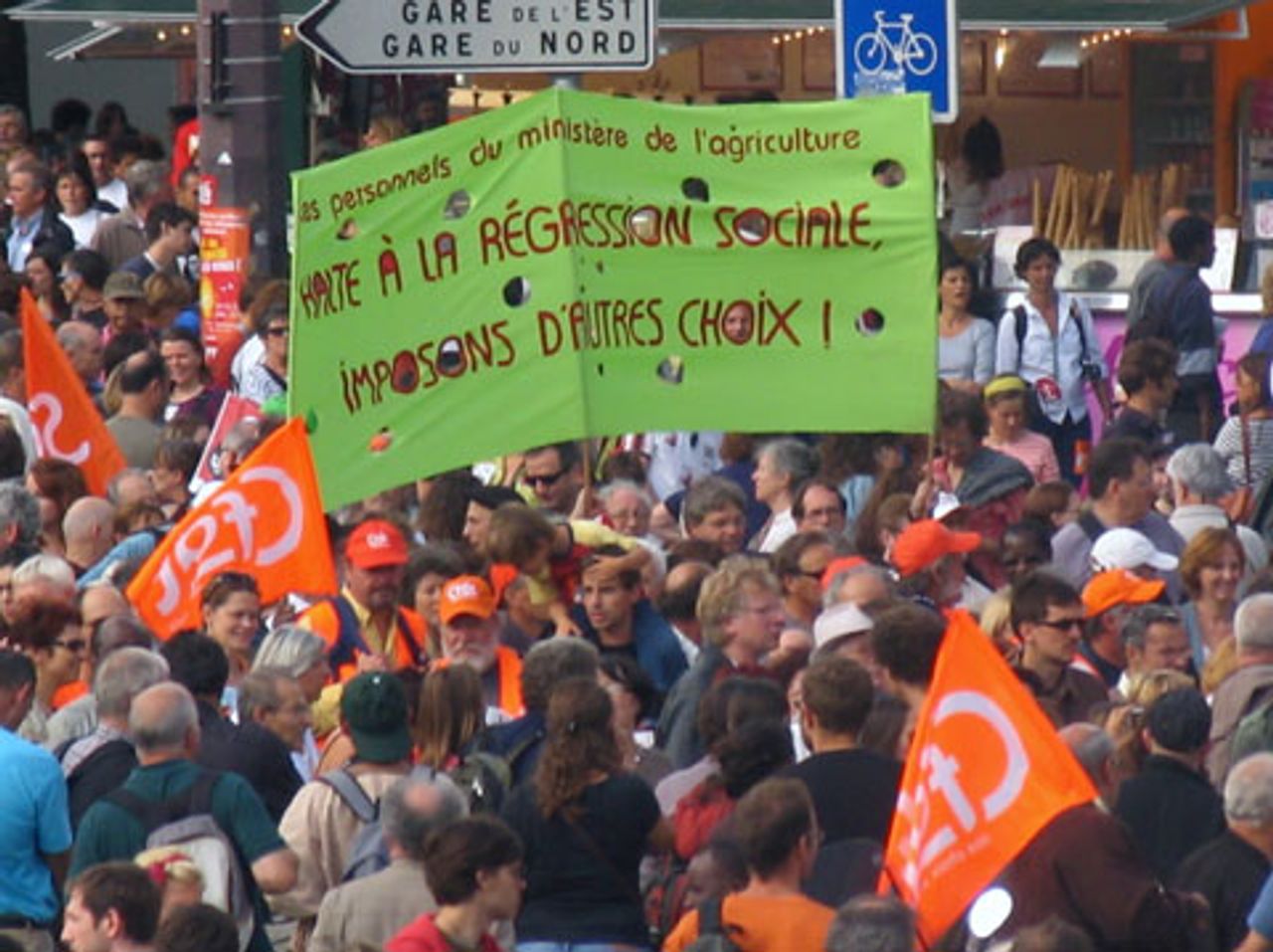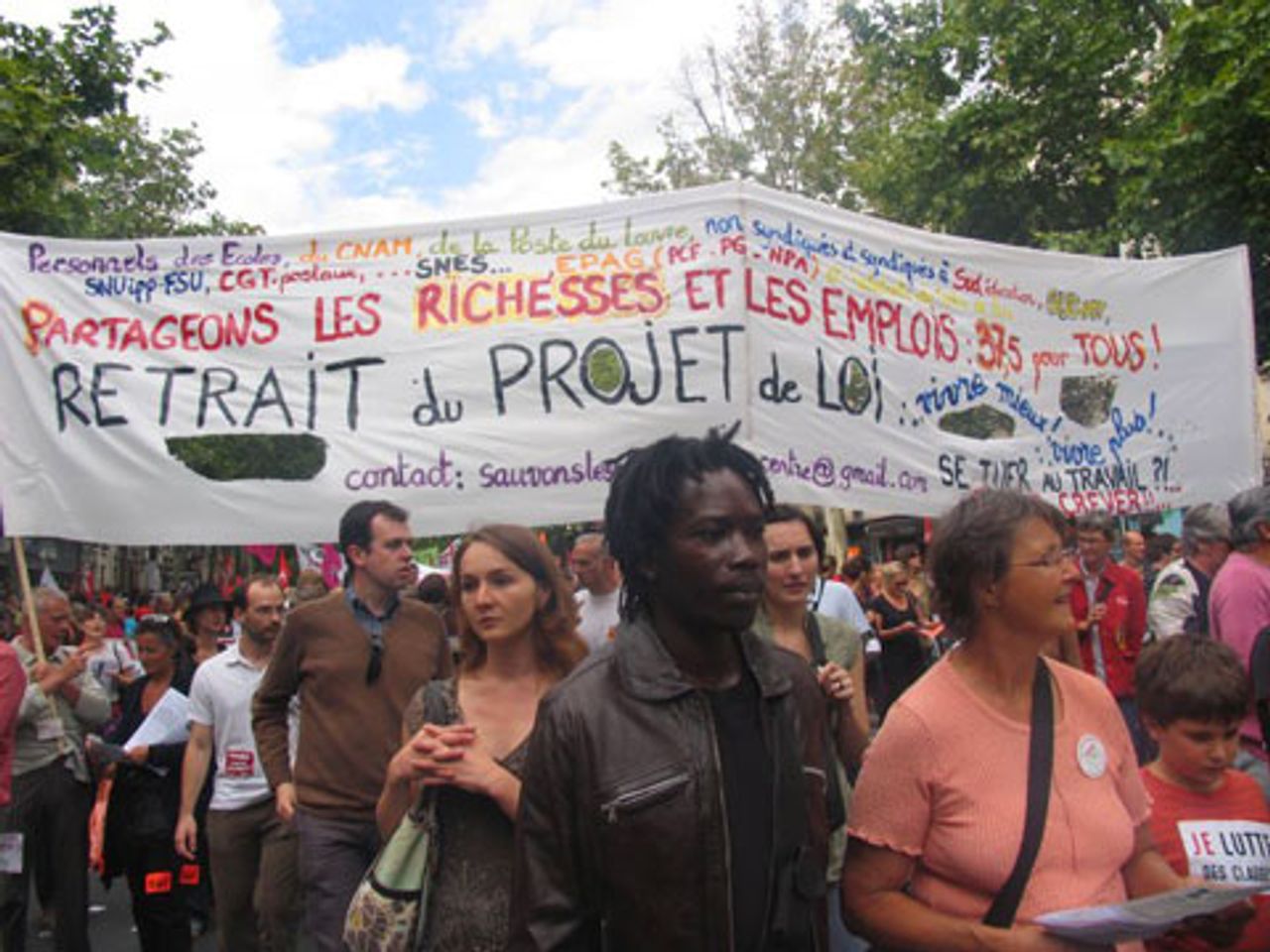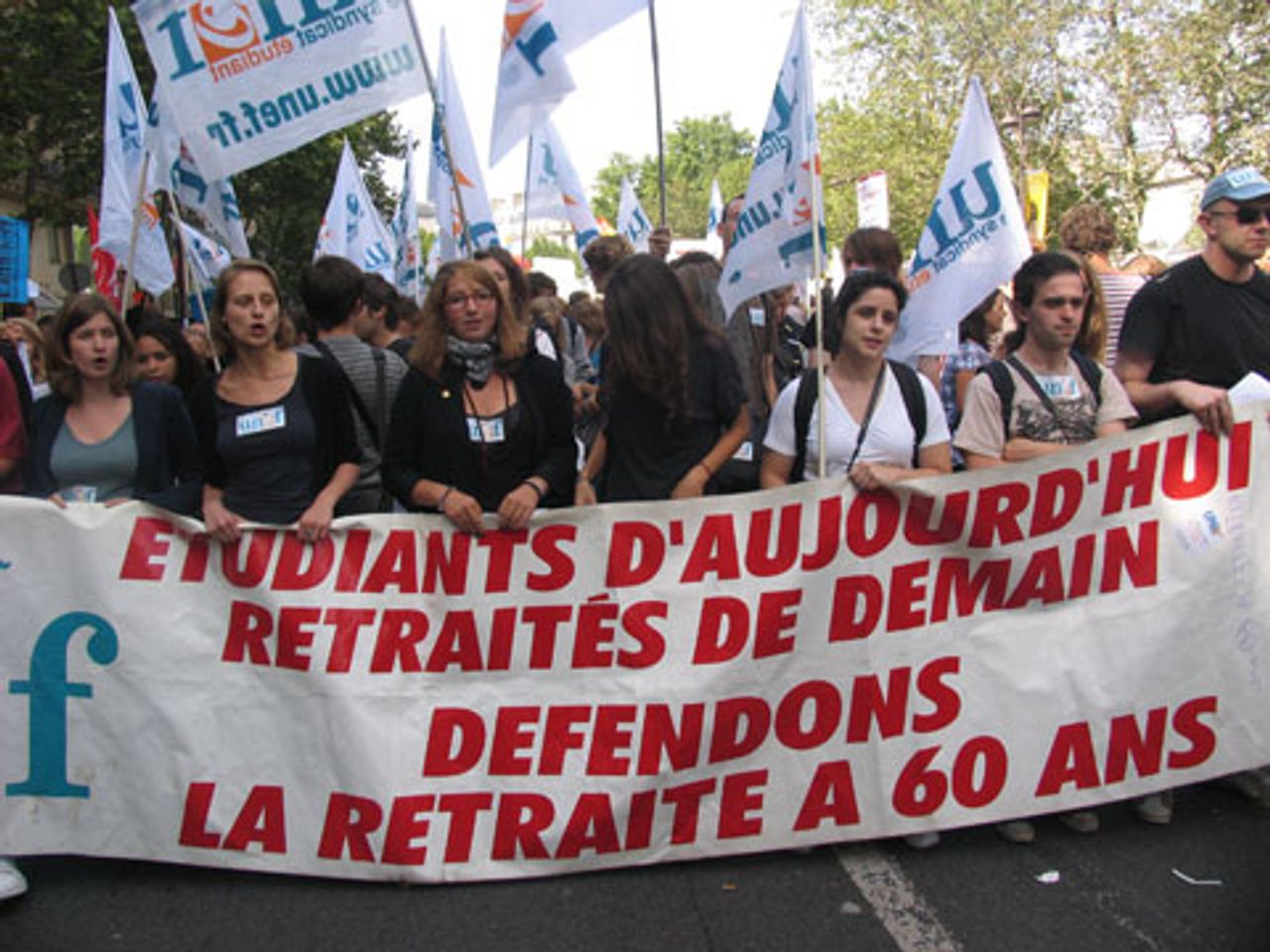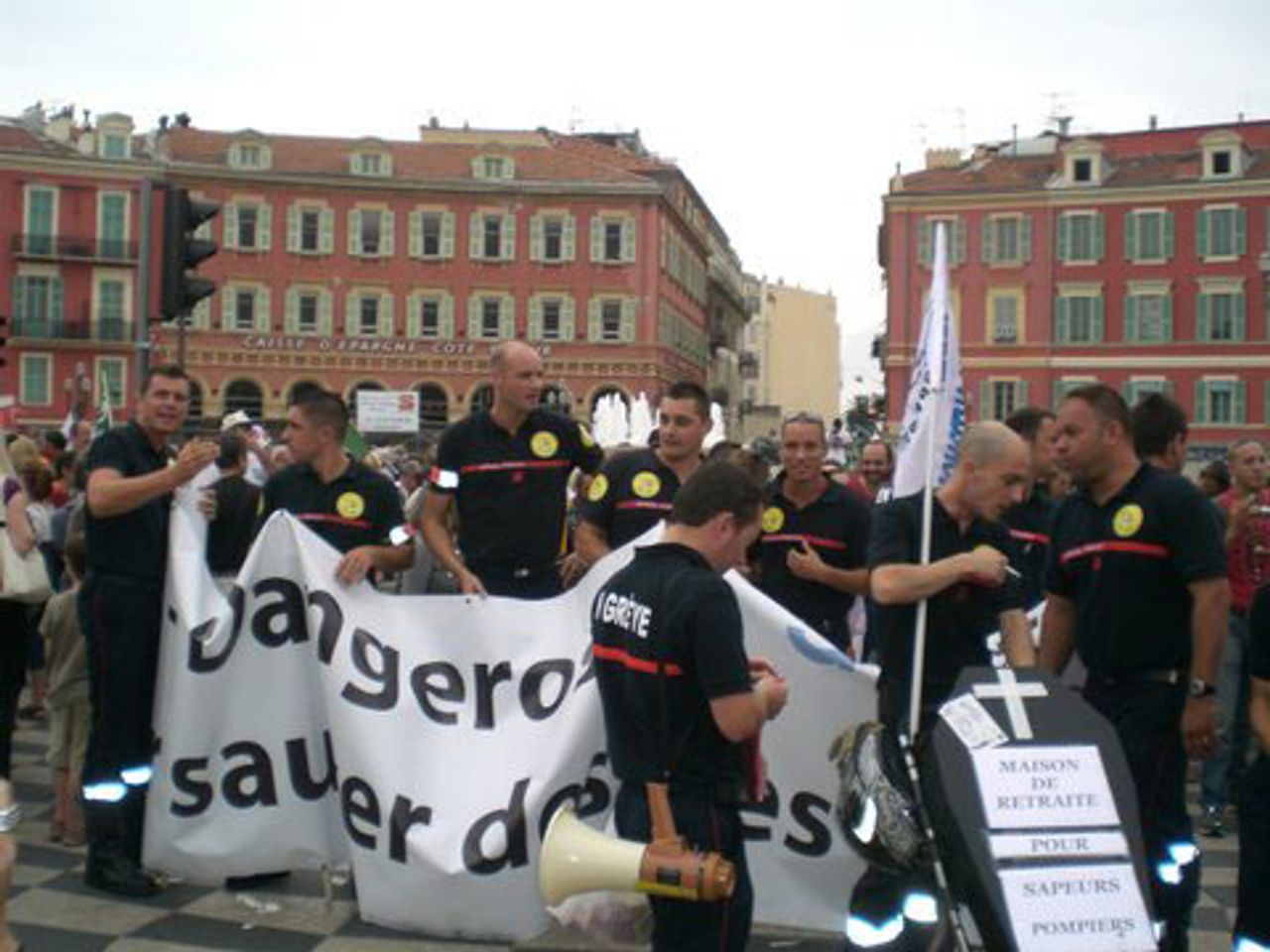 Paris banner reads "Agriculture ministry staff. Stop social regresson. We must impose other choices"
Paris banner reads "Agriculture ministry staff. Stop social regresson. We must impose other choices"More than two million workers and youth demonstrated in 220 towns and cities across France on Tuesday in opposition to cuts in pensions being imposed by President Nicolas Sarkozy. Alongside the marches and rallies, over two million workers in the pubic sector held a one-day strike and were joined by many private-sector workers.
The massive “day of action” called by the trade union federations followed demonstrations held Saturday against Sarkozy’s mass expulsion of Roma and associated law-and-order proposals that mobilized over 100,000 people across the country.
Tuesday’s protests were the largest so far against Sarkozy’s pension “reforms,” surpassing the previous record turnout last June by 40 percent, according to estimates by both the police and protest organizers. The day of action was timed to coincide with the start of parliamentary debate on the pensions bill.
 Another Paris banner reads:"Share the wealth and the jobs. Withdraw the bill. Live better, live longer"
Another Paris banner reads:"Share the wealth and the jobs. Withdraw the bill. Live better, live longer"According to union estimates, marchers in Paris numbered 270,000, double that of June. In Marseille, 200,000 turned out, while in Rennes 48,000 workers mobilised. Toulouse saw 110,000 on the streets, and Lyon had a crowd of 35,000. Bordeaux protestors numbered 100,000.
The main teachers union federation, FSU, estimated that 60 percent of primary and 55 percent of secondary school teachers, about half a million, went on strike. Over 25 percent of state government workers and over half of railway workers, 22 percent of the RATP Paris metro and bus workers, up to 40 percent of postal workers and 38 percent of France Telecom’s 100,000 workers went on strike for the day.
 Students in Paris. Banner reads:"Students today - pensioners tomorrow. Defend retirement at 60"
Students in Paris. Banner reads:"Students today - pensioners tomorrow. Defend retirement at 60"Over 21 percent of workers struck at the EDF national electricity company, causing the company to lose 8,000 megawatts. Transport was paralysed in the Paris region, leaving 152 kilometres of traffic jams.
The Civil Aviation Authority cancelled 25 percent of flights in the Paris region. France’s six state oil refineries were on minimum output. Banks and private industry sectors affected included Rhodia, Renault and Peugeot-Citroën, Saint-Gobain, Alcatel, Airbus and Total Oil.
Opinion polls showed 73 percent of the French population supporting the day of action.
The mass turnout made all the more stark the contradiction between the determination and readiness to struggle of the working class and the cowardice and treachery of the trade union federations. The day of action was called by the Stalinist-linked CGT (General Confederation of Labour) and the Socialist Party-linked CFDT (French Democratic Confederation of Labour). It was supported by the Socialist Party, the Communist Party, the Greens, and the New Anti-Capitalist Party, as well as other so-called “far left” organizations.
 Firemen at the demonstration in Nice
Firemen at the demonstration in NiceThe French unions repeatedly call one-day strikes and protests in order to sap the workers’ militancy and wear down their resistance while the union leaders negotiate their terms of surrender with Sarkozy. That the unions are preparing yet another betrayal was indicated by their insistence that industrial action be limited to one day (rail workers had sought to extend their strike) and their call for renewed talks with the government.
The unions promote the illusion that the attack on pensions—including raising the retirement age by two years—and other social cuts can be stopped by pressuring the parliament, even though Sarkozy has a clear majority to pass the “reform” legislation. At the same time, the unions seek to channel working class anger behind the Socialist Party’s electoral aspirations for 2012.
They face growing scepticism among workers. According to opinion polls, 65 percent of respondents saw the protests as having no impact on the government’s policies, and 48 percent thought the “left [the Socialist Party] would not repeal any of Sarkozy’s reforms” if it captured the presidency in 2012.
In defiance of union instructions, railway workers in Picardy continued on strike on Wednesday. Both Bernard Thibault of the CGT and François Chérèque of the CFDT made it clear that action had to be halted until they had received a response from the government. This is despite Sarkozy’s assertion after the day of action that the government would not budge on raising the legal age of retirement from 60 to 62.
After Sarkozy announced Wednesday that no significant changes had been made to the pensions bill, the unions called another day of action for September 23.
On Monday, the president’s special advisor, Henri Guaino, had invited the unions to negotiations on certain minor aspects of the pension “reform.” Thibault responded with the claim that the government was “changing its tune.”
Chérèque, speaking on France 2 TV on Tuesday, entreated the government to reply quickly with concessions before a meeting of union leaders on Wednesday afternoon, obviously seeking a pretext for winding down the protest movement. Refusing to be drawn on any follow-up to the protest, he categorically ruled out an indefinite strike, as has Thibault, and suggested that a demonstration on a Saturday or Sunday might be appropriate.
Significantly, the unions and both the Socialist Party and the Communist Party have refrained from any attacks on the pension legislation’s chief promoter, Eric Woerth, who is mired in scandals over allegations that he obtained illegal political funding for the ruling UMP (Union for a Popular Movement) and Sarkozy himself in exchange for millions of euros in tax exemptions for billionaire heiress Lilliane Bettencourt. Woerth has congratulated the unions for their “elegance.”
A young woman demonstrating in Paris against President Sarkozy’s pension cuts told the World Socialist Web Site, “The union won’t follow the people who want to continue to fight. I don’t think there will be a general strike. I don’t think the unions are going to organise it because they are traitors. Last year there were so many strikes in the factories, but they weren’t coordinated. I expect nothing from the trade unions nor from the political parties. The far left hardly exists.
“Also, there’s a danger like in the 1930s of a growth of racism and far-right parties, which are given more and more media coverage. It’s a regression.”
In Amiens, the WSWS interviewed Julien, a teacher at a vocational high school, and his friend Céline, who works in a cultural centre.
Céline said, “Just now I’ve got a job on a six-month contract. I’m 28 and for 10 years I've had nothing but temporary and part-time jobs.My parents will be obliged to work until their bones break because they’ve got three unemployed children.”
Julien said, “There are lots of young qualified people unemployed, while some of my colleagues at school who are nearing retirement are out of step with the young.” He said they should be able to retire on a full pension and thus give the young an opening.
Julien saw the government’s persecution of Roma and its anti-immigrant measures as a logical extension of its social policies. He saw Sarkosy’s campaign against immigrants’ rights as “a breach” in basic democratic rights and a drift towards Berlusconi. “Sarkozy is not exactly a fascist, but it’s disturbing,” he said.
Sullivan, a machine operator for over nine years at the Amiens Dunlop tyre plant, spoke of the unhealthy, dust-laden conditions and heavy, physically exhausting work at the factory. He was particularly bitter at a deal done between Dunlop and the CGT which greatly intensifies the work rhythms. “The CGT betrayed us,” he said. “For ten years the unions have won no struggles. I think the Socialist Party would do the same as Sarkozy, considering what it already did when it was in power before. It only works for the rich.”
